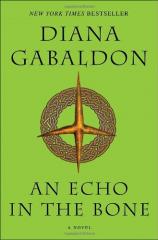An Echo in the Bone
Review
An Echo in the Bone
Dear Diana,
Forgive the informality, but after spending the last 10 days inhabiting, inhaling and, frankly, wallowing in the uncanny world of your seventh Outlander novel, AN ECHO IN THE BONE, I feel that we are friends, d’ye ken? (For the poor unlucky people who haven’t yet read the series, the last name is Gabaldon.) And because letters are an important feature of your novel --- in this one they literally bridge the 18th and 20th centuries --- I decided to put my review in epistolary form.
May I ask how in heaven’s name you ever thought to write a romance between people born in different centuries? I mean, literary love clearly thrives on obstacles, but this age difference is ridiculous. Your vast fan base will already know (but bear with me for the sake of newcomers) that in Outlander Claire Beauchamp, an English nurse vacationing in the Highlands in 1945, mysteriously “travels” via a Stonehenge-like circle of stones to Scotland in the 1740s, and in short order finds herself married to one Jamie Fraser, a tall, redheaded soldier who is fighting to restore Bonnie Prince Charlie to the throne.
In the volumes that follow you deliver a lot of action: warfare, piracy, hair-raising escapes, lusty sex, and more time-traveling (when Claire finds she is pregnant and believes Jamie to be dead, she returns temporarily to the 20th century). You also summon poignant moments. The Outlander time-travelers are, in a way, displaced persons, only the displacement is temporal rather than geographical. Like Dorothy in that famous movie they might say, “There’s no place like home,” only where (or more crucially, when) is “home”?
Finally, Claire and Jamie make their way to the American colonies and settle in North Carolina. Of course, soon they find themselves right smack in the middle of another rebellion against the English throne. But you show us an American Revolution unlike the one we studied in school: confusing, messy, brutal, more like a civil war than a conflict in which the two sides are clearly drawn…and although Claire and Jamie know the outcome (Claire from history books, Jamie on pure trust), nobody else does. Diana, I love the way you introduce characters whose celebrated triumphs --- or fates --- are still in the future (Benedict Arnold before he was a traitor, for instance). I am especially appreciative of your resistance to “trophy” research; you integrate it rather than display it, never intruding on or distracting from the story.
As in many of your Outlander books, there are also sequences that take place in (more or less) modern times. Jamie and Claire’s daughter, Brianna --- born, raised and educated as an engineer in the 20th century, but later an “émigré” to the 1700s --- and Roger Wakefield, her historian husband, also a time-traveler, have two kids born in the 18th century. As AN ECHO IN THE BONE opens, the family has leap-frogged a few centuries, to Scotland in 1980, to get medical help for their daughter. They move into the ancestral Fraser home in Lallybroch, and here they find letters from Jamie and Claire, written and left for them during the Frasers’ own visit to Scotland in 1777-78. (Am I explaining this well enough? Would you like to take over?) The best way I can put it is that the Frasers have created a sort of inter-century mailbox.
I have to say, Diana, that I had a little trouble keeping all the characters and subplots and relationships --- and dates! --- straight. There are complications and contradictions galore: A young English officer who is actually Jamie’s son and doesn’t know it. An English lord and secret agent who is in love with Jamie, but who at one point marries Claire. A man showing up in the 20th century who turns out to be Roger’s grandfather. (Thanks to your rich fan culture; I accessed an enlightening online timeline: http://web.me.com/mawaltz/Tursachan/timeline.pdf. I recommend it.)
There are many familiar pleasures in AN ECHO IN THE BONE. I was delighted to follow Claire’s further medical adventures (trained as a surgeon on her return visit to the 20th century, she reinvents ether, struggles against chauvinistic doctors, and blithely amputates and acupunctures her way through a shifting landscape of war and illness); hear the music of Gaelic again (usually I hate it when foreign phrases are thrown into English-language writing, but in your books it works); and once more admire the forcefulness and fearlessness of Claire and her daughter --- who, as always in your books, leave a long trail of stunned and flummoxed males in their wake.
My only complaint, really, is that AN ECHO IN THE BONE is so darned long. I don’t mind that it took time to read --- in fact, I relished it --- but I don’t live in a car culture, and it’s impossible to tote the current volume along with me on the subway. Every day I had to wait until nighttime to see what happened next.
On the other hand, for future books to have less of Claire and Jamie and Brianna and Roger would be tragic. So forget I said anything. Maybe next time you’ll hit 1,000 pages. I’ll be waiting.
Yours, Kathy
Reviewed by Kathy Weissman on April 25, 2011





